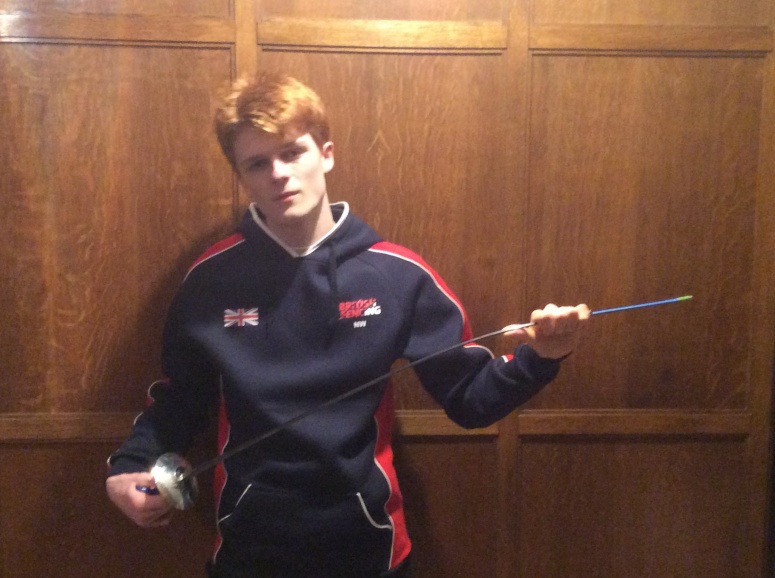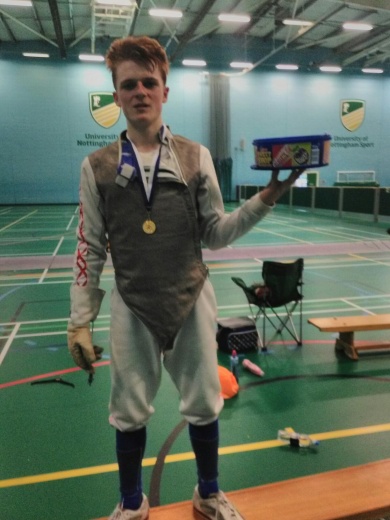Fencing Champion!
Nicholas, Y11, has been fencing since he was 9. He has won Gold Medals in regional youth tournaments and in the national Leon Paul Junior Series. Nicholas finished 10th in the under 14s in last year’s British Youth Championships and became an England International this year as part of the Under 15 Foil team chosen to compete in Wrocslaw, Poland. He has just started the Cadet (under 17) season with 19th place out of 69 competitors in the British championships – 8th highest of the English fencers of his age in the field. Here Nicholas talks about his fencing and combining school work with high level sport.
exciting update
Nicholas had been selected for the Great Britain U17 Foil team for the international tournament in Cabries in Provence in the first weekend of December. He reached an automatic selection place in the rankings by the selection date after strong performances in September and October in events counting towards the U17 rankings, including an open U17 international in Manchester and a British U20 tournament in Newcastle.
Nicholas's debut for Great Britain U17s has been brought forward as we've had a last minute call for him to join the team for the event in Budapest this week, for which he had been on the reserve list. It's been a busy day of arranging flights and accommodation etc!
We also now know that he'll be in the team for the tournament in Halle, Germany in mid-December as well as the one in Cabries at the start of the month!

Fencing involves a lot of time and travel. I train four evenings a week and one of these is in Nottingham. By Christmas I’ll have done about 15 weekend tournaments in 2018 and over half of these have involved a long journey and an overnight stay.
This commitment can be arduous at times such as returning home from a busy day at school when I would rather kick back and relax. However, I always put the effort in, knowing that it is worth it and that hard practice will bring results. This is, in my opinion, the difference between those who stick with it and those who, however talented, drop out.
Another important aspect is the ability to stomach defeat, learn and move on. Losing a match is hard in any sport but it’s par for the course. Everyone will suffer defeats in bouts - in the pool rounds and in the direct eliminations - and it feels unpleasant and it always will but it is how you handle this that determines how far you will go. I like to think of defeats as learning experiences and not failures as the latter is negative psychologically. I have known some high ability fencers who have been unable to handle defeats in matches and have consequently dropped out.
It’s important to be organized about homework and revision, particularly in Autumn term when a lot of weekends are taken up by tournaments. I try to get homework done pretty much straight away when I get back from school before eating and going out for practice. You can also work the extra fitness training into normal activities. I often run home from school, and swimming once a week is good, especially because it’s a balanced action whereas the fencing is very one-sided.
In the Summer holiday there’s more time to focus on the fencing. Most serious fencers do at least a week’s training camp. Two years ago I did one in Truro, Cornwall, where fencing’s very popular. For the last couple of years we’ve been lucky in Sheffield that Ziemek Wojciechowski , the British Olympic coach, has done a camp here. It’s been great to work with him. Last year Husayn Rosowsky, the Olympic fencer who grew up and learned to fence in Sheffield, took part in the camp. One day we gave him a lift back to his parents’ house and it was very helpful to pick his brains on training methods.
This year I did the camp at the University of East London in the fantastic SportsDock venue right by the Thames. The camp was run by Newham Sword Club. The club coaches, Pierre Harper and Linda Strachan, are both multiple times British champions who have fenced at the Olympics, and there were lots of good fencers of my age and a bit older at the camp so I got 4 days of intensive, valuable sparring.
In the Summer holiday I can do more fitness work – this is mainly short, repeated sprints to increase leg strength to get faster, more powerful attacks and quicker, more stable movements going backwards. I can also spend more time on the electronic target board I’ve got at home and on watching top fencers on YouTube.
Sometimes tournaments can be mixed with holidays. We had a short holiday touring in Scotland when I had a competition there, there’s sometimes the chance for sightseeing in London, and the Paris Marathon Foil was brilliant. We celebrated when I got through to the final day of the event with a meal in a restaurant where I ate snails in garlic, and when I got knocked-out the next day we saw as many sights as we could before the flight back.
I really enjoyed my time in Poland with the England squad. The fencing was high quality and tough, especially against the big Russian who eliminated me, and it was good to spend time with and get to know other team members from around the country, since until then I’d only seen most of them at competitions. It’s made tournaments since then a bit of a social event as well as competitive. I hope to be able to take part in more English and British squads in future! I’m also going to broaden my involvement in fencing. I’ll be taking a refereeing course at the next opportunity and when I turn 16 I can start working my way up through the different levels of coaching qualifications as this is something I would like to do future.
UPDATE 17/9/18
Here's Nicholas with the spoils of victory from a 14-15 age group tournament in the national Leon Paul Junior Series in Nottingham this weekend. In the knock-out stage matches are up to 15, and he won the final 15-14, from being 13-14 down - a nail-biting conclusion! He was undefeated through the day, winning 12 matches and registering 100 hits for and 43 against.

